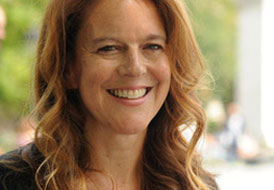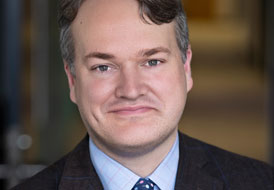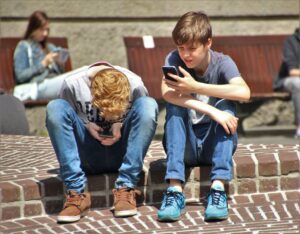Fathers Forum 2024
The Crisis of Connection: How Parents Can Help
February 26, 2024
By John Lloyd
At NYC-Parents in Action’s annual Fathers Forum, hundreds of fathers and other caregivers gathered at Trinity School’s Upper West Side campus and online to hear a lively and thought-provoking discussion about building connection between parents and their children.
This year’s panel was co-led by NYC-PIA’s own Charles Harkless and Oscar Bleetstein. After brief welcome remarks by John Allman, Head of School at Trinity, Oscar and Charles introduced this year’s panelists, all of whom are parents themselves, to discuss the widespread alienation and disconnection impacting both children and parents:
- José De Jesús, head of The Dalton School
- Robbie Pennoyer, head of Grace Church School
- Dr. Niobe Way, author, professor, and internationally recognized thought leader in Developmental Psychology
As Oscar highlighted, NYC-Parent in Action’s motto is “Be involved, be informed, be connected.”
The Crisis of Connection
Dr. Way has studied what she calls “the crisis of connection” for decades, co-editing an anthology called The Crisis of Connection: Roots, Consequences, and Solutions. She described the crisis as “a disconnection from self and others, so we’re increasingly not following our hearts, following what we really want in life.”

When asked by researchers, young people consistently say they want “friendships, closeness, someone who won’t laugh at their vulnerability, [with whom] they can be their real selves, [who will] listen and hear them as they really are rather than how we stereotype them.”
But “[w]e define maturity as independence or autonomy, self-sufficiency. Connection is not part of our notions of maturity, the ability to have mutually supportive relationships. Can you support someone else and they can support you? Can you have that mutuality?”
She defines it as a crisis because this sense of disconnectedness is growing. Studies have long tracked the number of connections people report (defined, she said, as “how many people you feel like you can turn to if you need to talk to someone”). In the 1980s, the most common answer was three. By 2004, the most common answer was zero.
Emotional vs. Relational Intelligence
Oscar asked Dr. Way to address a topic she’s written about, “relational intelligence.” She began by acknowledging the amazing work that has been done studying Emotional Intelligence, which “is focused on the self. [But] we don’t even have a concept of ‘Relational Intelligence.’ The ability to listen and allow someone [else] to be seen as they see themselves.” And when developmental psychologists study emotions, they study “emotional regulation and not emotional sensitivity.”
This resonated with the other panelists. De Jesús described a recent workshop his school held together with an organization called Narrative 4 that showed “how much of a deficit there can be in something as simple as the human experience of listening to another person.”

Robbie Pennoyer said that the mission of Grace and other independent schools is to “create communities where kids feel … they are seen in their fullness, means creating institutions that are somewhat counter-cultural.”
Dr. Way noted a Harvard study showing that 80 percent of parents value academic achievement over kindness. “We have to model that friendships matter. And friendships are critical in our lives.” She acknowledged that this can be difficult, but she asked us to try to hold onto the idea that “success has to [include] character development, being a generous person, listening with curiosity. Being able to be there for another person.”
Anxiety and Mental Health
Charles asked what the panel thought of the level of anxiety now vs. before the pandemic; Dr. De Jesús agreed that anxiety has risen amongst students. “I do think our schools, independent schools specifically, have historically been a space where there is a lot of anxiety.” His school is in the middle of a year-long study on health and wellness.
But he also felt that “our students are talking about it more.” When he was a kid in school, he was “incredibly anxious. But I didn’t have language for it. No one was encouraging me to talk about it. We’re picking it up more because we’re talking about it openly … and naming it as such.”
Pennoyer agreed, saying, “We are seeing data that says the rise of anxiety is real. I love the reduction of stigma that seems to exist right now amongst students in terms of seeking help.” The negative side, he worries, can be “making normal high school feelings pathological, catastrophizing feelings of healthy anxiety that are inherent to human experience.”
Dr. Way posited that both perspectives are correct: we’re acknowledging it more but it is also increasing in absolute terms. But she also thought that we might be confusing cause and effect: “It’s the lack of connection that’s leading to mental health problems. It’s the starving for connection. When it’s not met, it’s depressing. It’s anxiety provoking, it leads to loneliness. And in the most extreme cases of isolation, possibly suicide. So, we have to see depression and anxiety as products of a culture that doesn’t value relationships and connection.”

Pennoyer suggested we can rethink anxiety so as not to overweight things outside our control. “I went outside, it was raining, and I’m in a foul mood because it was raining. If we endorse that model of how emotions work, then to feel better, we have to get it to stop raining. And that’s just not going to work.”
Typically, when adults engage, “[w]e ask a kid, what made you do that? Or what made you feel that way? We’re endorsing the external [cause]: happenstance is responsible for how I’m feeling,” noted Pennoyer. An alternative approach is to ask, “What do you want? What are you doing to get it? Is it working?” This gives the child agency. He called this “a profound responsibility. We have to teach kids how to take steps themselves rather than just swooping in to solve [their problems].”
The Impact of Covid
Parents at NYC-PIA Parent Talks often raise concerns about the “Post-Covid Socialization Deficit.”
Pennoyer said that the consequences were different depending on the age of the child during the height of the pandemic. “There are certain core experiences to childhood that one must have in person; they don’t work mediated by a screen. Friction is an important part of one’s learning and one’s development.” When you don’t have that in-person experience, when you instead only experience “masks that disguise the reaction of the people beside you, there are going to be impacts.”
Agreeing that it was age specific, De Jesús said: “I want you all to remember what it felt like to be a very awkward eleven- or twelve-year-old. Think about everything you went through.” Puberty, your first crush, getting a sense of what you like, establishing your relationships with adults. “Now imagine not having that experience. You’re at home for the most part, and you don’t have those opportunities. We are seeing it with ages that were in that middle band during the heart of the pandemic.”
Adolescent Boys
An audience member submitted a question about adolescent boys and their propensity to be “closed off.”
Dr. Way framed the problem: “We raise boys to go against their nature, because they all have soft sides, just like all other humans. It’s not an individual problem. It’s a cultural problem. We’re not valuing what humans need. So how do you get boys to start connecting to their own feelings? It’s not to flip the hierarchy and say, ‘feelings are better than thinking,’ it’s to say that we need to think and feel because that’s what humans do. And you need to normalize it.”
She also stressed that “they don’t need to talk to you, they just need to talk to people that they can trust. It could be their teachers, it could be their friends, it could be their aunt or grandmother, don’t [insist] that it has to be with you. Because that that kind of pressure is not going to work.”
Pennoyer picked up on this. A key is “listening deeply for the person that they want to be, recognizing that we all have this gap that divides who we are from who we want to be, and offering unconditional love.” He acknowledged that “they’re going to test [your love] with their silence. Do you really mean it? When I don’t give you the update, are you still loving me? [And] when they share something, [you’re] not pouncing with judgment?”
Curiosity
Nurturing curiosity about other people came up repeatedly as a prerequisite to connection.
As Dr. Way said, “The only capacity we have to connect to another person is through our curiosity. If you’re not curious about me, then I’m not going to be curious about you. We need our curiosity to connect.”
Exhibiting curiosity about your kids is not just asking whether they did their homework, “but genuinely being curious about what they’re interested in.”
De Jesús agreed and spoke about resources available to parents: “in 2024, our schools are set up so that you have partners who really do know your children pretty well. So, the question is, what do you value in terms of information about your child? [If you] talk to the soccer coach, [don’t] focus just on playing time. [Ask] how is your child in the context of the team. When you’re talking to a teacher, of course still ask about academics. But be curious. ‘So how is Billy?’ It could be that at home, you’re not seeing it … With my son’s advisor, I actively ask about those relational pieces.”
Setting the Example
He also recommended conducting a “self-audit,” and described his own experience looking at Apple’s Screen Time tool: “I did not have a consciousness about my own use. I was using it when I was near my own children. And I was using it when I was near my students. What they’re seeing is me actively engaged with this thing. I had to make some conscious changes, which is a work in progress.”
 Dr. Way spoke about looking to your children for advice: “A friend doesn’t respond on a text. And I would turn to my daughter and my son and say, ‘that makes me feel so bad, that she’s not responding to my texts. What do you think I should do?’ I was asking genuinely, but it was giving them the authority of giving me some advice on how to deal with conflict and friendship. And that was more effective than saying, ‘Tell me about your friendships,’ which feels like another judgment question, like, ‘Are you friends with the good kids? Are you friends with the bad kids?’”
Dr. Way spoke about looking to your children for advice: “A friend doesn’t respond on a text. And I would turn to my daughter and my son and say, ‘that makes me feel so bad, that she’s not responding to my texts. What do you think I should do?’ I was asking genuinely, but it was giving them the authority of giving me some advice on how to deal with conflict and friendship. And that was more effective than saying, ‘Tell me about your friendships,’ which feels like another judgment question, like, ‘Are you friends with the good kids? Are you friends with the bad kids?’”
Pennoyer believes that “we have chosen to over-parent kids in the real world and under-parent them in digital spaces … We can take away the phone, but we need to replace it with some of those lost aspects of childhood, like play.”
He also reminded us to have “a certain measure of grace for yourself. Otherwise, you can get hung up in your own guilt.” He described the online experience that young girls in particular endure as “compare and despair.” If you recognize that in yourself, resist comparing your own parenting to that of others.
Achievement Culture
An audience member asked, “Are parents today afraid to let their children fail?” The panelists in general agreed this was an issue. They discussed their own struggles as parents rather than as experts.
De Jesús asked a key question for all parents: “What is failure? Is a B+ failure? Is not being a starter on the basketball team failure? Is [getting into a college] that’s a really good school [but not] a top 50 school failure?
“Kids very, very rarely really fail,” he said. “Their job is to try things. Their job is to not get everything all the time, their job is to grow. And growth is filled with awkwardness and failure.”
Pennoyer underscored de Jesús’ point about the strength children develop from their early struggles. He remembered “students who didn’t know the [small] failures of school. They were the kid that everyone wanted to be. And then at age 25, they encountered the first meaningful difficulty in their life and their whole sense of who they are crumbles like a house of cards.”
 He also highlighted the relative unimportance of small struggles in the grander scheme. He described a recent episode where his four-year-old bit another child in school. He pointed out that “turning over your own mental health to a four-year-old [is] not a good move.” But he also reflected on serious medical issues that each of his newborns had. The memory of the terror he felt back then helps him regain perspective. “I imagine a universal experience of parenthood is a memory of sheer terror. How can we hold on to those experiences and find something beautiful and healthy and productive in them?” For him, he’s reminded of his unconditional love for his children. “What a gift that I have him. And I don’t always remember that.”
He also highlighted the relative unimportance of small struggles in the grander scheme. He described a recent episode where his four-year-old bit another child in school. He pointed out that “turning over your own mental health to a four-year-old [is] not a good move.” But he also reflected on serious medical issues that each of his newborns had. The memory of the terror he felt back then helps him regain perspective. “I imagine a universal experience of parenthood is a memory of sheer terror. How can we hold on to those experiences and find something beautiful and healthy and productive in them?” For him, he’s reminded of his unconditional love for his children. “What a gift that I have him. And I don’t always remember that.”
Dr. Way also reflected on her struggle to keep her perspective on her kids: “I’ve been worrying about them for their whole life. We project our anxieties onto our children. Sometimes my panic that my children are not going to succeed in the way I … want them to succeed gets in the way of recognizing I have two extraordinarily generous children who are very kind people.”
The Role of the Arts
A parent asked about the role of the arts in education and in staying connected. Dr. Way admitted she is concerned about education trends. She talked about the shrinking number of college students choosing the humanities. “We’re losing English majors; we’re losing language majors. What’s the function of education? It has now become to get a well-paying job rather than to be a full human. A liberal arts education is supposed to be a humanist-based education. But it’s now about productivity.”
De Jesús spoke about the value that all children continue to get from art. Returning to the value of failure, he related how his son was described by his pottery teacher: “You know, a potter fails a lot. You’re creating this thing, and the physical mechanics of it [are] imperfect. He talked about [my son’s] ability to stick with it, to get to this result. I can’t think of a comment that made me prouder of either of my children.
“The arts is a space where we can explore humanity: fail, create, develop, communicate … I hope our schools will stay very focused on that.”
Pennoyer agreed, saying that “kids today are much better than when I was growing up at understanding art as more than a beautiful diversion from the present, but as having the power to transform.”
Final Thoughts
Oscar related a provocative parent question: “What is the best way to pass along the best of us?”
Dr. Way said that “we’ve got to nurture curiosity, because that curiosity allows us to see the bigger world outside of ourselves, to gain a sense of purpose, to see what we can learn from each other about what it means to live a meaningful life … that is at the root of real cultural change that can lead to the place we want to go. So translate that to your kids.”
 De Jesús spoke about the power of stories. “Every single time when I visit Puerto Rico, my grandfather would drive past the hospital where I was born. And every single time he would tell the story of how I was born, and how he saw me. I feel like I could tell who I am through story.” He sees the continuity of family through their stories. His daughter “knows about the narrative, she knows about the racism, she knows about the migrant experience … She knows about the beauty; she knows about the brilliance. “We can impart that in an age-appropriate manner. One of the delightful things about seeing my kids get older is what I can share with them and … how I can bring them in.”
De Jesús spoke about the power of stories. “Every single time when I visit Puerto Rico, my grandfather would drive past the hospital where I was born. And every single time he would tell the story of how I was born, and how he saw me. I feel like I could tell who I am through story.” He sees the continuity of family through their stories. His daughter “knows about the narrative, she knows about the racism, she knows about the migrant experience … She knows about the beauty; she knows about the brilliance. “We can impart that in an age-appropriate manner. One of the delightful things about seeing my kids get older is what I can share with them and … how I can bring them in.”
Pennoyer’s hope for his children is that they “will carry with them a sense that they arrived into this world loved; not as a reward for their worthiness, not something they earned, but that it was just a gift, that they arrived loved by a community and a world that welcomed them, and that they can find themselves in service to others, that in extending love to others they’ll learn something about what it means to be themselves.”
Despite her concerns about the crisis of connection, Dr. Way ended on a positive note on parents’ ability to model curiosity and non-judgmental friendship: “We have it within ourselves already. We had it all as five-year-olds. It’s just a matter of tapping into that knowledge that we were born with, and then we’ll naturally be able to tune into becoming even better parents.”.

